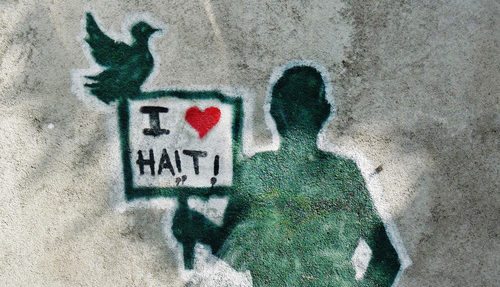Moving Through the Heaviness of Humanitarian Aid Work
A Humanitarian Aid Worker and Documentary Filmmaker Reflects on Contemplative-Based Resilience Training
By Amy BrathwaiteThis post is in honor of World Humanitarian Day 2016.
Four years ago, I was one year into my humanitarian aid mission in Port-au-Prince, Haiti. Picture this: My chest is tight, my hands are jittery, and my stomach is in knots. I have just returned from my last intended “R&R” and can already feel my resistance to stress evaporating. The unprecedented cholera outbreak, exacerbated by a relentless hurricane season, swirled tainted water and rubble through the debris-filled streets. I just had an argument with my supervisor. I feel my integrity and character in question, a toxic work environment breeding mistrust and untruths. I feel stuck. I feel paralyzed with the weight of rage and helplessness. I cannot go for a walk because the gates are guarded. I cannot get away from anyone because the compound is locked. I walk behind a trailer and throw a plastic chair against a corrugated fence. I fall down and cry angry tears.
Fast forward to 2015. I approach the earthen steps to the stone buildings of the Garrison Institute to attend a Contemplative-Based Resilience Training (CBRT). I know I am to meet with strangers from around the world, with a shared experience of international humanitarian aid work. Comradery comes quickly with this crowd and walls quickly drop and moments of connection unfold. We spend an introspective five days absorbed in our newfound community, a safe place to lay so many burdens, many of which we have carried silently and in isolation. The toll of aid work can weigh heavily on the soul. And with the guidance of our facilitators, we moved through the heaviness and developed resilience through tools including yoga, meditation and mindfulness practices. These are tools that I believe would’ve helped me in moments of despair, which would’ve enabled me to stop in that moment in Port-au-Prince because I could have understood the physiological impact of stress in my body. And these tools would not only arm me with compassion for myself and others, but would provide a key to unlock the tension that was eroding my resilience.
Since leaving Haiti, there have been a succession of events that have facilitated my own process of healing, and attending the CBRT training felt like the culmination of that journey. In between my mission and CBRT, I returned to Canada and started working as a photographer. I switched to a creative field that helped my weary soul—a vocation that celebrated light, joy, and connectivity. In the space between work and healing, I still carried agitation, disconnect and heaviness. Yet I knew I wasn’t alone in my unsettledness; so I decided to use my camera to tell the story of the psychosocial impact of aid work. Through good fortune and the generosity of others, I completed a short documentary called Kick at the Darkness.
The film has enabled me to share my story through a variety of platforms, to connect with global advocates and those who’ve emerged from the darkness to say, “me too.” But none of those moments matched the intensity, healing and connected feeling that came from spending five days in that quiet space in Garrison. This training, while it came years after leaving the mission, facilitated what felt like permission to let go. The program enables individuals to unpack their burdens and share collectively in the often unspoken trauma, hopelessness and burnout that can come from relief work. This work acknowledges the volatility and increased danger that aid workers face in a changing humanitarian landscape. It can help people move through their accumulated tensions, stressors or traumas, build community and facilitate healing in the process.
Amy Brathwaite is a photographer, writer, documentary filmmaker, and humanitarian aid worker.
Photo by Amy Brathwaite.

Beautiful, Amy. Thank you. t.
Thank you Teri ♥ You ignited the flame!
Thank you, Amy, for planting another seed. Thank you for the work you have done.
Thank you Mary – so grateful to have connected with you in that sacred space last year. Solidarity with you, as you continue your good work -it’s needed more than ever.